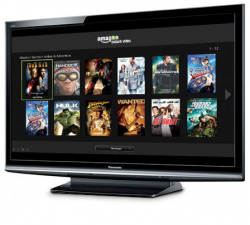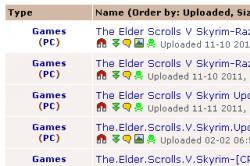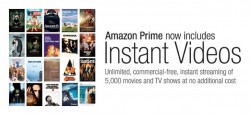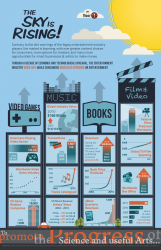Welcome to another edition of the Weekly News Roundup. I’ve just finished writing the PowerDVD 12 review, and it only took me a month! Writing the obligatory PowerDVD review has become a sort of ritual for me, as I’ve been doing it since pretty much version 1.0 of the software (it’s now version 12, not quite 12 years, but close to a decade at least). Over that time, the review has morphed slightly into a “how to” guide, or at the very least, an overview of the major functions. For this particular review though, I’ve completely restructured the review sections so that it’s a bit easier to read. Now all I have to do is to write the review for the comparable WinDVD 11, which is only overdue by 5 month!
Skyrim update: Just managed to get my Alchemy and Smithing levels up to 100, now to get Enchanting up to 100, and to get the relevant perks so I can start making awesome, unstoppable armor and weapons. Had to purchase another house so I could more easily manage my hoarding.

We start the week with two stories that I briefly touched upon in the last WNR. First up, federal prosecutors have expanded the case against Megaupload, and revealed that over $50 million in “Mega assets” have been seized so far.
The newly added charges relate to the allegation that when content holders requested a file to be taken down, Megaupload merely removed the specified link to the file, without removing the actual file in question. This is problematic as the same file can be linked multiple times based on the way the Megaupload’s server works, and so Megaupload was doing “just the minimum” (or not even that) when it came to file removal, even though they could (and should) have done more. It’s a lesson to other file sharing/user generated websites: take removal requests seriously if you want DMCA safe harbor to apply, otherwise, you might as well just ignore the take down request, since you’re not fooling anyone. Pro-active content removal will help to make the case that you do care about copyright infringement, but the law does not require such actions, other than for really obvious cases of infringement. Had Megaupload done what was needed, then the criminal case against them might have been impossible to establish. On an unrelated note, Kim DotCom, the owner of Megaupload, was released on bail this week.
The Pirate Bay has had a busy February as well. Not only are they planning to remove all .torrent files, replacing them with Magnet Links instead, they’ve also changed domain names, from their original .org domain to .se. The reason for the change is fairly apparent – .org domain names comes under the authority of the United States, and so it could easily be seized by the US government (and I’m surprised they haven’t done so). The fact that a Swedish website wants to avoid falling under the jurisdiction of the United States is perfectly understandable to everyone. Everyone except for the RIAA, of course, who came on attacking TPB for blatantly trying to “escape U.S. laws”, the very same laws that doesn’t apply to a Swedish website anyway. The RIAA appealed again to xenophobics, using phrases such as “foreign rogue sites” and blabbing on about “American jobs”, despite music being a global industry, and piracy being a global problem. It’s something ‘Winston’ from The Pirate Bay spoke of when he wrote a response to the RIAA’s latest attacks, that the America-centric view coming from the likes of the RIAA and MPAA, that somehow only US interests are important. Via SOPA/PIPA, the RIAA and MPAA have also started pointing the finger at the rest of the world, blame “foreigners” for all their copyright woes, despite research showing their own short-sighted greediness (ie. release windows) is at the heart of the problem.
Another thing that Winston touched upon is the disingenuous use of the phrase “creative community” by these trade groups that often only represent a small number of major labels and studios. The truth is that not only are they not the creative community (or any kind of community, as Winston points out), but they’re the ones that are most aggressive at exploiting and profiting from the same community, often at its expense (and that of real artists and real creativity).
And in order to keep exploiting and profiting, the major rights holders have shown they’re willing and capable of doing anything in order to keep the money rolling in. For them, little things like censorship, privacy and the right to innovate, if counter to their own interests, can all be sacrificed. Which is why despite various EU rulings on the possible illegality of web censorship, the music industry is still pursuing, and winning, their case against The Pirate Bay in the UK, and it’s looking increasingly likely that UK ISPs will soon be forced to block access to the website. Not that it would actually stop people visiting, since earlier blocked sites such as Newzbin2 are still being frequented by UK visitors using tools that were quickly developed to bypass the blocking filters – the operators of Newzbin2 says that 93% of their former UK visitors have continued to visit the website thanks to these new tools. There are also all sorts of jurisdictional issues involved, such as whether an UK ISP has the right to block access to a Swedish website to protect the interest of US companies.
And with the web now an integral part of most people’s lives, nobody wants to see it irrevocably damaged. But even so, I was really surprised to see so many people protesting the controversial ACTA (Anti-Counterfeiting Trade Agreement) treaty in the streets of Europe. And it’s working, with the EU suspending ratification of ACTA until the legal positions are studied in further detail, which should have been the case all along, as opposed to cowardly caving to corporate interests. The usual critics will demean these protests as “freeloaders wanting to keep the free stuff coming”, but people who say that are also devaluing the importance of critical issues of censorship and privacy, issues at the heart of any democracy. I guess in some ways this is a delayed response to the sacrifices that have been made in the last decade to these core issues, due to fears of terrorism. I strongly agree that people who would sacrifice freedom for security deserve neither, but at the very least, that response is an understandable human one (even if it is the wrong one). But sacrificing freedom for the benefit of a select few mega-corporations is just not acceptable, and I’m glad others feel the same way too. Freedom and democracy is worth protecting at the expense of everything else, in my opinion.

With this WNR coming in a little bit short, I have a bit more room to share a few recent thoughts about where things are headed in terms of home entertainment.

VOD is the future of TV, as once viewers get a taste of the power of choice, they won't want to go back
While I’ve long been a supporter of Internet based streaming, and the benefits of video-on-demand, I’ve not really had much experience using it, since we’re pretty behind the rest of the world here in Australia when it comes to these sort of things. Having got a Kindle Fire to do a bit of development work, I soon became absolutely hooked to Amazon Prime SVOD. It’s really my first taste at what Americans have been enjoying for a while now (and with better services than Amazon Prime, and not having to route it through a VPN), and it completely confirms for me what, up until that point, had largely been a theory – that we’re on the verge of a major revolution in how we watch TV and movies. It’s not so much what we watch, as what we have access to. It feels incredibly powerful and freeing to know that you have access to, for example, every episode of Star Trek ever made (which is available for unlimited streaming on Amazon Prime, as long as you pay the $79 per year membership fee), and the phrase “there’s nothing on” could very well become extinct if the technology continues to advance, and if content holders continue to support innovation in this area. And once you go VOD, you don’t really want to go back to a time where executive in suits determine what you should watch, and when.
And it’s a huge financial opportunity as well for all involved. From an advertising point of view, ads can be targeted, interactive and non repetitive, and the tiered subscription model provides value, as well as ensuring stability revenue wise (compared to a model based purely on ads). That nearly 1 in 3 American households now regularly enjoy streaming content on their TV (so not just something you do on a tablet, or a computer, but in the living room) shows that people want it. It’s now up to the tech companies and the rights holders to knock out a deal that would make the ability to access everything an affordable reality, and I look forward to the day this is all available in Australia.
On that bright note, it’s time to say goodbye to this issue of the WNR. Have a good one, and see you next week.











